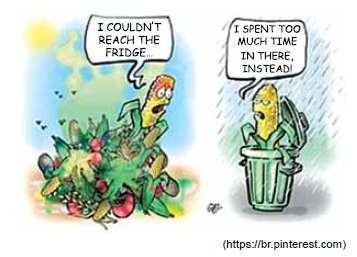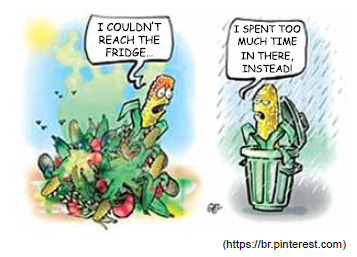Questões de Vestibular UNIFESP 2016 para Vestibular - Português \ Inglês \ Redação
Foram encontradas 15 questões
Leia o texto para responder à questão.
Reducing food waste would mitigate climate change, study shows
April 7, 2016

Reducing food waste around the world would help curb
emissions of planet-warming gases, lessening some of the
impacts of climate change such as more extreme weather
and rising seas, scientists said on Thursday.
Up to 14% of emissions from agriculture in 2050 could
be avoided by managing food use and distribution better,
according to a new study from the Potsdam Institute for
Climate Impact Research (PIK). “Agriculture is a major
driver of climate change, accounting for more than 20% of
overall global greenhouse gas emissions in 2010,” said
co-author Prajal Pradhan. “Avoiding food loss and waste would
therefore avoid unnecessary greenhouse gas emissions and
help mitigate climate change.”
Between 30 and 40% of food produced around the world
is never eaten, because it is spoiled after harvest and during
transportation, or thrown away by shops and consumers. The
share of food wasted is expected to increase drastically if emerging economies like China and India adopt western food
habits, including a shift to eating more meat, the researchers
warned. Richer countries tend to consume more food than is
healthy or simply waste it, they noted.
As poorer countries develop and the world’s population
grows, emissions associated with food waste could soar
from 0.5 gigatonnes (GT) of carbon dioxide equivalent per
year to between 1.9 and 2.5 GT annually by mid-century,
showed the study published in the Environmental Science &
Technology journal. It is widely argued that cutting food waste
and distributing the world’s surplus food where it is needed
could help tackle hunger in places that do not have enough -
especially given that land to expand farming is limited.
But Jürgen Kropp, another of the study’s co-authors and
PIK’s head of climate change and development, told the
Thomson Reuters Foundation the potential for food waste
curbs to reduce emissions should be given more attention.
“It is not a strategy of governments at the moment,” he said.
(www.theguardian.com. Adaptado.)
Leia o texto para responder à questão.
Reducing food waste would mitigate climate change, study shows
April 7, 2016

Reducing food waste around the world would help curb
emissions of planet-warming gases, lessening some of the
impacts of climate change such as more extreme weather
and rising seas, scientists said on Thursday.
Up to 14% of emissions from agriculture in 2050 could
be avoided by managing food use and distribution better,
according to a new study from the Potsdam Institute for
Climate Impact Research (PIK). “Agriculture is a major
driver of climate change, accounting for more than 20% of
overall global greenhouse gas emissions in 2010,” said
co-author Prajal Pradhan. “Avoiding food loss and waste would
therefore avoid unnecessary greenhouse gas emissions and
help mitigate climate change.”
Between 30 and 40% of food produced around the world
is never eaten, because it is spoiled after harvest and during
transportation, or thrown away by shops and consumers. The
share of food wasted is expected to increase drastically if emerging economies like China and India adopt western food
habits, including a shift to eating more meat, the researchers
warned. Richer countries tend to consume more food than is
healthy or simply waste it, they noted.
As poorer countries develop and the world’s population
grows, emissions associated with food waste could soar
from 0.5 gigatonnes (GT) of carbon dioxide equivalent per
year to between 1.9 and 2.5 GT annually by mid-century,
showed the study published in the Environmental Science &
Technology journal. It is widely argued that cutting food waste
and distributing the world’s surplus food where it is needed
could help tackle hunger in places that do not have enough -
especially given that land to expand farming is limited.
But Jürgen Kropp, another of the study’s co-authors and
PIK’s head of climate change and development, told the
Thomson Reuters Foundation the potential for food waste
curbs to reduce emissions should be given more attention.
“It is not a strategy of governments at the moment,” he said.
(www.theguardian.com. Adaptado.)
Leia o texto para responder à questão.
Reducing food waste would mitigate climate change, study shows
April 7, 2016

Reducing food waste around the world would help curb
emissions of planet-warming gases, lessening some of the
impacts of climate change such as more extreme weather
and rising seas, scientists said on Thursday.
Up to 14% of emissions from agriculture in 2050 could
be avoided by managing food use and distribution better,
according to a new study from the Potsdam Institute for
Climate Impact Research (PIK). “Agriculture is a major
driver of climate change, accounting for more than 20% of
overall global greenhouse gas emissions in 2010,” said
co-author Prajal Pradhan. “Avoiding food loss and waste would
therefore avoid unnecessary greenhouse gas emissions and
help mitigate climate change.”
Between 30 and 40% of food produced around the world
is never eaten, because it is spoiled after harvest and during
transportation, or thrown away by shops and consumers. The
share of food wasted is expected to increase drastically if emerging economies like China and India adopt western food
habits, including a shift to eating more meat, the researchers
warned. Richer countries tend to consume more food than is
healthy or simply waste it, they noted.
As poorer countries develop and the world’s population
grows, emissions associated with food waste could soar
from 0.5 gigatonnes (GT) of carbon dioxide equivalent per
year to between 1.9 and 2.5 GT annually by mid-century,
showed the study published in the Environmental Science &
Technology journal. It is widely argued that cutting food waste
and distributing the world’s surplus food where it is needed
could help tackle hunger in places that do not have enough -
especially given that land to expand farming is limited.
But Jürgen Kropp, another of the study’s co-authors and
PIK’s head of climate change and development, told the
Thomson Reuters Foundation the potential for food waste
curbs to reduce emissions should be given more attention.
“It is not a strategy of governments at the moment,” he said.
(www.theguardian.com. Adaptado.)

In developing countries there are high levels of what is known as “food loss”, which is unintentional wastage, often due to poor equipment, transportation and infrastructure. In wealthy countries, there are low levels of unintentional losses but high levels of “food waste”, which involves food being thrown away by consumers because they have purchased too much, or by retailers who reject food because of exacting aesthetic standards.
(www.theguardian.com)
 The corncob on the left
The corncob on the left Na fala da espiga de milho à esquerda “I couldn’t reach the
fridge...”, o termo em destaque pode ser substituído, sem
alteração de sentido, por
Na fala da espiga de milho à esquerda “I couldn’t reach the
fridge...”, o termo em destaque pode ser substituído, sem
alteração de sentido, por